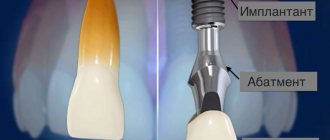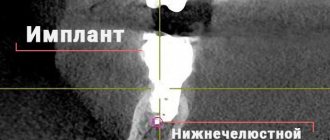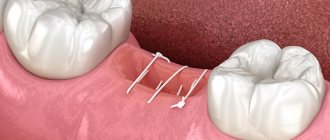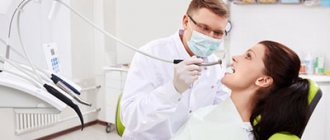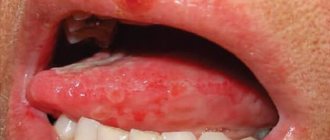21.11.2019
After dental implantation, the patient must carefully monitor the condition of the oral cavity and strictly follow all the doctor’s recommendations. This largely determines how fast and successful the healing process will be.
In addition to the patient’s age, as well as his existing diseases, the implant’s implantation is influenced by diet and bad habits, one of which is smoking. Patients who smoke know that they must abstain from cigarettes during preparation for surgery and immediately after it. However, many guards are interested in the question: when can you smoke after dental implantation, so as not to cause implant rejection and not interfere with the healing process?
What could be the consequences?
Most patients believe that the success of this operation depends solely on the specialist who implements the dental implants. If complications occur or the implant is rejected, almost 70% of people begin to blame the doctor and the dental clinic as a whole: they use cheap implants, save on consumables, doctors are not knowledgeable enough about this issue, etc.
In fact, this is not true at all. To a large extent, everything depends on the characteristics of the body and the patient’s behavior during the rehabilitation period. Some bad habits can seriously affect the success of surgery; let’s look at each of them in more detail.
How does nicotine affect the condition of teeth and oral cavity?
What consequences can a bad habit lead to:
- For a smoker, any dental treatment can result in complications, even a simple tooth extraction. Dry socket syndrome is often observed when a blood clot necessary for wound healing and protection does not form. The absence of a blood clot often causes alveolitis, followed by osteomyelitis, abscess, and phlegmon.
- Tobacco smoking slowly but surely leads to atrophy (thinning) of the jaw bone. Insufficient bone density is the main contraindication to implantation.
- Most smokers by the age of 30-35 have periodontal disease, as nicotine worsens the condition of the gums. This leads to weakening of the periodontal ligaments and loosening of the teeth.
- Smokers are more susceptible to oral infections.
- After bone grafting and implantation, the risk of foreign body rejection increases.
- Nicotine reduces the protective properties of salivary fluid, which accelerates the development of bacterial microflora. It also causes inflammation of the mouths of the salivary glands at the base of the palate.
- Provokes leukoplakia of the oral cavity, cancer of the mucous membrane.
- It disrupts the natural blood supply, so healing after any operation takes longer and is more difficult.
- The immune strength of the body as a whole decreases, which leads to exacerbation of chronic diseases and inflammatory processes.
- The high temperature of tobacco smoke leads to thinning of the enamel, increased tooth sensitivity, and discoloration of the crown.
Smoking
Smoking is another dangerous habit. We are not even talking about the effect on the entire body as a whole, but specifically on the condition of the oral cavity. Tobacco smoke contains many harmful impurities. They lead to deterioration of tissue nutrition. This is especially dangerous if the patient has undergone a sinus lift. Let's look at how tobacco smoke is harmful after implantation:
- When you inhale tobacco smoke, a vacuum is created in the oral cavity. This provokes the development of bleeding. Then the wound becomes open - pathogenic microorganisms can enter it and cause inflammation or infection.
- Kurene provokes dry mouth and impaired saliva production - this is an ideal environment for the proliferation of pathogenic microorganisms.
- Healthy cells in the oral cavity are actively dying - this increases the risk of dental implant failure.
Ideally, you should not smoke after implantation for at least one week. Although, not every patient follows this rule.
What complications do smokers experience after having implants installed?
After the implant is installed and has successfully taken root, the doctor attaches an abutment to it and then places a crown. After a few months, the patient completely gets used to the new tooth, can calmly eat any food and smile confidently.
For smokers, the healing process is not always easy and fast. It is often accompanied by a number of complications that you need to know about in advance.
Let's look at them.
- The process of repairing damaged tissue in smokers is two times slower than in non-smokers. Therefore, they should not consume sweets, certain drinks and solid foods for much longer. Many patients cannot withstand these restrictions, thereby increasing the risk of inflammation, suppuration, or dehiscence in the unhealed wound.
- A smoker's jawbone loses strength and elasticity, so it may simply not withstand the implant (break or reject it). Smokers are much more likely to need a sinus lift than non-smokers
- Tobacco tar and nicotine enter the implant through saliva, causing oxidation and damage. If this happens, the implant will have to be removed
- Smoking increases blood pressure in the capillaries, causing bleeding, bruising and swelling around the artificial tooth.
- Hot tobacco smoke has a bad effect on the condition of the seams, and they can come apart
- Nicotine tars provoke the formation of plaque, which is deposited on the teeth and eventually turns into tartar. The stone must be removed, otherwise it will put pressure on the crown, and the crown will put pressure on the implant. This may lead to his rejection
- Hot smoke causes burns to the mucous membranes, which increases the risk of developing peri-implantitis by 40%. A wound with pus forms on the gum, which puts pressure on the metal rod, displacing it
Useful tips
It is not so easy for long-term smokers to give up the bad habit. In this case, experts advise stopping smoking completely for at least two days after surgery, and then significantly reducing the number of cigarettes per day. As for alcohol, there are no concessions here; you need to wait until the mucous membrane has completely healed.
Take dental implants more seriously. Remember that this is a full-scale operation. Since you have decided to restore using this method, try to follow all the recommendations of your doctor.
How long should I abstain from smoking during implantation?
When installing implants for a smoker, the dentist selects a special model of tooth root substitutes and a technique that gives the least number of complications. But for better healing processes, if it is impossible to quit smoking, it is necessary to abstain at least for a certain time:
- 2–4 weeks before surgery. During this time, the mucous membranes of the oral cavity will recover from dryness and burns from hot smoke, and tissue nutrition will improve.
- 1.5–2 months after implantation. During this tobacco-free period, the wounds will heal and the gums will recover and tightly cover the installed implants.
In addition, to reduce the risk of artificial roots being rejected, a smoker needs to be especially careful about oral hygiene. And, if possible, reduce the number of cigarettes you smoke to a minimum.
Causes
There are several destructive aspects that prevent the body from adapting. Firstly, due to inhalation of hot smoke, the delicate tissues of the oral cavity are regularly injured. The result is an ordinary burn, which prevents all damage from healing and the foreign body from successfully taking root. In this case, the chances of developing peri-implantitis greatly increase.
Secondly, during smoking the level of salivation decreases, which significantly dries out the thin gum tissue. This causes the development of a huge number of harmful bacteria, which in the future can cause the above-mentioned peri-implantitis. This leads to implant rejection.
Thirdly, nicotine has a detrimental effect on blood vessels. They are located in large numbers in the mucous tissues of the oral cavity and in the upper layers of the jaw itself. Under the influence of the substance they undergo prolonged spasms. This reduces the level of blood supply, therefore, the amount of oxygen and nutrients decreases. This also worsens the healing situation. As a result, there is a risk of implant rejection.
How to reduce risks
The optimal solution to all problems would be to completely give up cigarettes, but for many it is not so easy to make such a decision and take such a strong-willed step. Just think about the fact that a healthy, beautiful smile is much more important than a bad habit that you can break if you really want to.
You need to be prepared that if you quit smoking, nothing bad will happen. Narcologists note that the assumption - “if you quit suddenly, you can even die” is nothing more than a myth. On the contrary, toxins will begin to be eliminated from the body, your health will improve, and the implants will fully take root.
Here are some useful tips to help reduce possible risks:
- properly and fully prepare for dental restoration (more on this below),
- find a good implantologist, since the success of implantation depends 90% on his skills,
- tell the dentist about your habit,
- pay attention to what implants, methods of their installation and accompanying drugs for regeneration will be suggested by the doctor - a separate approach is taken for smoking patients (as well as for people with chronic diseases), we will tell you in more detail below.
Myth #4: Implant rejection
Most often, when hearing the word “implantation,” patients have a direct association with organ transplantation, and they naturally project this onto dental implantation. In fact, there is a huge difference between the engraftment of a donor organ and a dental organ.
A dental implant, unlike a transplanted organ, is integrated into the bone tissue (osseointegration) rather than engrafted.
Osseointegration is the process of ingrowth of bone cells into the complex surface of a dental implant.
Thus, the implant is securely held in the jaw bone. The healing process can be affected by infection of the tissues surrounding the dental implant, excessive stress on the implant, failure of the surgeon to follow the implant installation protocol, and the use of inappropriate equipment and instruments.
Myth No. 6: Implantation is impossible if the jaw bone is atrophied
Indeed, if the jaw bone tissue is too “thin” or “loose”, then there is simply no place to place a dental implant. For this reason, some dentists even refuse implantation to the patient.
If you were denied implantation, then most likely your dentist does not know the technique of jaw bone augmentation. Jaw bone augmentation is a technique that allows you to fill the missing volume of bone tissue for implantation. The most common osteoplastic surgeries are:
Sinus lifting is a surgical change in the relief of the bottom of the Maxillary sinus. It involves lifting the membrane lining the bottom of the sinus and filling the resulting space with artificial bone granules.
Guided bone regeneration surgery or GBR. The essence of this operation is to graft bone into the atrophied area and fix it with a barrier membrane.
Splitting of the narrow alveolar ridge. The operation involves thin cutting of the alveolar process of the jaw bone, spreading its edges and filling the resulting space with bone granules.
Augmentation with bone blocks - the surgical technique consists of taking from one area (most often the mental or retromolar) and transplanting a piece of bone into the atrophied area of the bone.
Alcohol and dental implants
Drinking alcohol and smoking is a kind of combo of bad habits that significantly increases the risk of complications. Of course, we are not talking about moderate alcohol consumption when you allow yourself a conventional glass of wine with dinner. It is best to completely abstain from drinking alcohol for several weeks before and after implant placement. Reviews from patients who completely gave up cigarettes and alcohol during treatment prove that getting rid of bad habits not only makes treatment more predictable, but also generally improves the quality of life.
Optimal implant models for smokers
The basal protocol uses special implants that are implanted into the deep and sterile layers of the jawbone. They have a smooth antibacterial coating that prevents the spread of inflammatory processes. A popular brand is Oneway Biomed. For zygomatic implantation and All-on-4, All-on-6, Pro Arch methods, only models from Nobel Biocare and Straumann are used.
When restoring 1-2 teeth, implantologists give preference to implants with an ultrahydrophilic surface. Coated with phosphorus, fluorine, with nanostructures for the correct growth of the thinnest bone partitions (which make up the entire bone mass). This coating attracts calcium and young bone cells, which means that such structures will take root much faster. These include, for example, Nobel Biocare brand implants with TiUnite and TiUltra coatings or Straumann with SLActive surface.
Myth #5: Age restrictions
Sometimes patients do not consider the option of restoring teeth with implants and choose less comfortable removable dentures, thinking that due to the patient’s age, the installed implants may be rejected.
In fact, age is not an absolute contraindication for dental implantation. Agree, age and tooth loss are interconnected things.
In fact, age may be a contraindication if the patient cannot fully brush his teeth on his own and has serious diseases that prevent implantation. To get a consultation
Relationship between smoking and complications after sinus lift
Long-term studies show that smoking patients (category I) have a significantly higher risk of complications after dental surgery than non-smokers (category II). The level of the problem is truly amazing:
- minor complications were observed in 50% of patients from category I and 23% from category II;
- severe complications - in 33% of category I and 7% of category II.
Minor and common complications after surgery include:
- the appearance of a fistula;
- minor inflammatory processes;
- sinusitis and sinusitis;
- disturbances in the level of fluid in the bone;
- swelling;
- temporary paresthesia.
Severe and quite rare include:
- damage to the integrity of the membrane or lining of the maxillary sinus;
- high temperature (up to 40°), accompanied by heavy bleeding;
- entry of the implant into the sinus;
- weak or strong mobility of the implant.
All these complications can be caused by smoking after sinus lifting and bone grafting . The effectiveness of implantation in the area of the maxillary sinuses has a clear connection with the use of tobacco products - the failure of implants in category I is 3 times higher than in category II. To understand why this happens, you need to understand the effect of smoking on the body in more detail.
One-stage implantation in the absence of more than 3 teeth in a row
For this category of patients, specialists usually use certain techniques and special models of implants. In the absence of a large number of teeth, a smoker usually experiences severe atrophy of the jaw bone and often inflamed areas of the mucous membrane. Therefore, the best option is one-stage implantation with immediate loading of the prosthesis. Let's consider what methods the dentist can offer depending on the condition of the bone tissue:
- All-on-4 from Nobel Biocare: for minor bone atrophy and gum inflammation,
- All-on-6 or Pro Arch from Straumann: for moderate atrophy/inflammation,
- basal implantation: for severe inflammation or atrophy on any of the jaws. Or at the risk of such processes in the future,
- zygomatic technique: suitable only for very pronounced bone atrophy in the upper dentition.
With all these methods, preliminary bone grafting is not necessary, which is traumatic and ineffective (success in only 40-60% of cases). Most often, zygomatic or basal techniques are used. On days 1-5 after surgery, a prosthesis is installed to further stabilize the implants. You need to start chewing food with your new teeth - this starts metabolic processes, the implants take root faster, and the person returns to their normal life.
For more information about the basal method, indications specifically for smokers, nuances of the operation and advantages, read the article “Basal implantation, or Basal Complex - a solution for those with a complex clinical case.”
Implantation day: can I smoke or not?
On the day of surgery, it is best not to smoke at all. Even if the procedure is scheduled after lunch or in the late afternoon, the morning cigarette will lead to the next one and a couple more due to possible stress. Moreover, over the previous days you have already begun to smoke less, got used to the “restrictions”, and it has become easier to breathe. And the body has recovered a little, so you shouldn’t put it under attack.
Is it possible to smoke with dental implants when they have just been installed? Immediately after surgery, smoking is strictly contraindicated. Studies show that even 1 cigarette smoked reduces the ability of gums and bones to regenerate by a third. You need to give time for the tissue to recover a little, the wounds to heal, and the implant to begin to take root. After this, experts strongly recommend not smoking for 2 weeks and minimizing the frequency of smoking for at least 1–1.5 months, optimally for 3–6 months.
Dental implantation using the Osstem system = 20,000 rubles. until March 31, 2022!
All inclusive, treatment guaranteed!
Premium implants at an affordable price. Free consultation with an implantologist +7 (495) 215-52-31 or write to us
The following are the most common problems encountered by smokers who think it is okay to smoke with newly installed implants:
- weak effect of local anesthesia due to narrowing of blood vessels due to nicotine and other toxins,
- prolonged bleeding and inhibition of the healing processes that have just begun - due to impaired blood circulation in the tissues,
- massive swelling and hematomas on the face after surgery,
- Constant exposure to cigarette tar often causes sutures to come apart, which necessitates their reapplication. As a result, the mucous membrane is subject to frequent trauma, and this is associated with the risk of pathological neoplasms. It also thins the gums - worse protection against germs and lower smile aesthetics,
- rehabilitation after treatment may take twice as long; the implants themselves take root more slowly - due to too slow tissue regeneration.
“If you want a beautiful smile, there’s nothing you can do – you’ll have to quit or smoke half as much. Before such an important operation, I myself was tormented by the question: is it possible to smoke after getting implants. You need to calm your nerves. But the doctor made it clear to me that if something goes wrong because of cigarettes, I only have myself to blame. After the operation, I stopped craving cigarettes altogether. A week later I tried it and didn’t want it anymore. So I quit, I haven’t smoked for a year and a half now...”
Alina S., St. Petersburg, from correspondence on the 32top.ru forum
